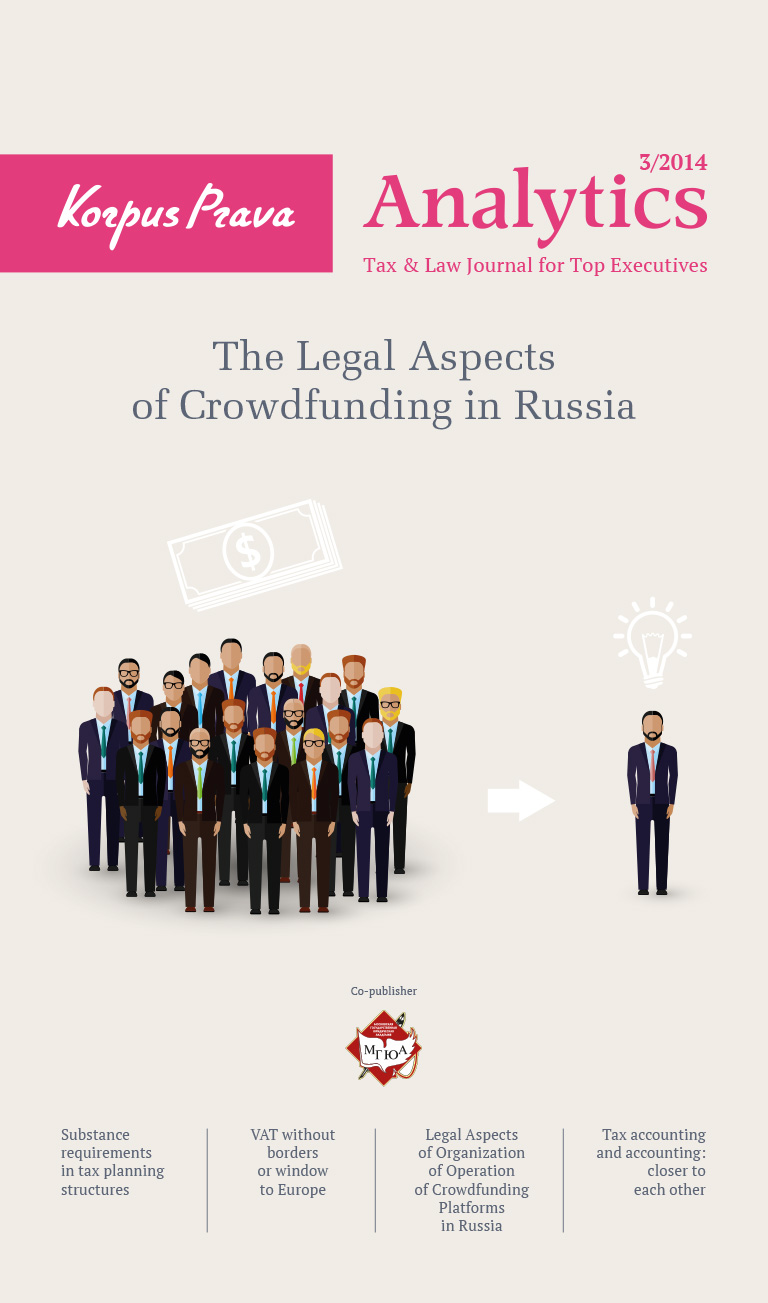- Cyprus Citizenship Scheme for Foreign Investors
- Squeezed But Pleased: Taxation of Passive Income in the European Union
- VAT Without Borders or Window to Europe
- Legal Aspects of Organization of Operation of Crowdfunding Platforms in Russia
- Substance Requirements in Tax Planning Structures
- “Deposit Splitting” of Individuals. Legal Civil and Criminal Aspects
Redomiciliation. Novel Russian legislation stating the change of personal law of the legal entity
Redomiciliation, being relatively undeveloped on a global scale, at the same time represents an actual topic that has been developed under private international law practice and doctrine.
In modern world business conditions, this institute is often embedded in business schemes whose goal is to search the favorable framework of the law for a legal entity.
“Redomiciliation” should be understood as the change of personal law of the legal entity and, as a consequence, of applicable law.
Personal law of the legal entity is one of the major law categories that provides ability to identify legal entity status, including in cross-border cases.
The personal law determining boils down to three conflict principles defined by the doctrine and practice of private international law:
- Place of incorporation;
- Place of residence;
- Place of business.
Doctrine of incorporation states the rule of Law application of the government where and under whose legislation legal entity was incorporated (Great Britain, Netherlands, Switzerland, Czech Republic, Russia, Canada, USA, Cyprus, Bahamas, etc.).
Doctrine of residence means that will be chosen legislation of that country where the executive body’s (-ies’) place is (France, Greece, Austria, Turkey, Estonia, Poland, Egypt, Georgia, etc.).
Under place of business doctrine, Law of country where real and main business activity exists will be exercised (often works as an additional conflict principle in relation to the principle of residence, for example, the relevant provisions are taken into account in the Egyptian and Estonian legislation).
In virtue of considered conflict principles, the possibility of correct determination of the applicable law to a legal entity appears, and, as a result, the possibility to understand whether the usage of redomiciliation provisions is possible in accordance with personal law. That is, to correctly define the current personal law means to find the correct answer to the question: “is it legally possible to conduct redomiciliation procedures for a particular legal entity”, because redomiciliation is permissible only if there is a legally established possibility of its implementation in accordance with the “initial” and “receiving” countries.
As noted above, the redomiciliation procedures are not globally developed, but Lawmakers tend to provide for the possibility of redomiciliation in the legislation or its prohibition (there are countries haven’t such procedure and special proscription in their legal orders, but practice presents cases of interpretation of the provisions absence by public authorities/registration bodies as a proscription and rejection to applicants).
Most often, the institute of redomiciliation is established under classic offshore or favorable tax regime jurisdictions legislation. In such countries, the processes of redomiciliation are often set in the general laws of the company and their activities, the so-called “Company Acts”.
The “transferring mechanisms” for companies moving between offshore states have become more popular in the context of stricter sanctions procedures, as well as improving tax legislation and enhancing the principle of transparency through the world.
As for the legislation of the Russian Federation, until recent changes of the personal law of a legal entity was not regulated by law, the institute of redomiciliation was not provided for as such.
As for today, amendments have been made to the Civil Code and a number of other regulatory acts relating to the change of the personal law of a legal entity (Tax Code of the Russian Federation, the Federal Law “On Currency Regulation”, the Federal Law “On Special Administrative Regions in the Kaliningrad Region and Primorsky Krai”, the Federal Law “On the Development of Small and Medium-Sized Business in the Russian Federation”, etc.).
Thus, Article 1202 “Personal law of a legal entity” of the Civil Code of the Russian Federation provides that the Personal Law of a legal entity is the law of the country where a legal entity is established (incorporated), unless otherwise provided by the Federal Law “On Amendments to the Federal Law “On the Introduction into effect of the Part One of the Civil Code of the Russian Federation” and Article 1202 of the third part of the Civil Code of the Russian Federation” and the Federal Law “On international companies”.
As one can see, the changes are related to the emergence and entry into force of the Federal Law of 03.08.2018 “On international companies”. This Law determines the legal status of a business entity with the status of an international company registered in the Uniform State Register of Legal Entities in connection with redomiciliation novels and amendments, including the rights and obligations of participants in such a legal entity, features of its activities, reorganization and liquidation.
In accordance with the new Federal Law, a foreign legal entity that is a commercial corporate organization and has decided to change its personal law in the manner prescribed by such personal law may become an international company.
The international company status may be presented to a foreign legal entity under certain conditions established by the Federal Law of 03.08.2018 No. 290-ФЗ “On International Companies” in Article 2.

A specific condition for obtaining the status of an international company (which is not characteristic of the classical redomiciliation institute) is the investment condition. Under Article 2 of the Federal Law the condition for assuming obligations to make investments in the territory of the Russian Federation is established, and the Law specifies in a referral manner what exactly is meant by “making investments in the territory of the Russian Federation”.

In accordance with Federal Law No. 39-FZ of February 25, 1999 “On investment activity in the Russian Federation carried out in the form of capital investments”, investments are funds, securities, other property, including property rights, other rights, having a monetary value, invested in objects of entrepreneurial and (or) other activities in order to gain profit and (or) achieve a different beneficial effect. The legislator also established the minimum sum of investments required to obtain the status of an international company – 50 000 000 rubles. The obligation of a foreign legal entity to invest in the territory of the Russian Federation extends to legal entities under its control, provided that such persons filed an application for state registration in the Russian Federation. In addition, the Law gives the international company the right to entrust the fulfillment of the following obligation to invest in any entity from the group to which foreign legal entity belongs.
An international company may have civil rights and bear civil obligations necessary to carry out any activities not prohibited by federal laws.
The law directly defines the absence of legal succession relations in connection with the state registration between a foreign legal entity and an international company.
In the context of the law, this does not mean the “disappearance” of the rights and obligations, on the contrary, since the date of state registration of an international company, it has all such rights and obligations, including:
- Real (property) rights and other rights to real and personal property (bona), including those located outside the territory of the Russian Federation;
- Partnership and participation rights in other organizations, including those related to the receipt of dividends and other income or payments;
- Rights to securities and other financial instruments, including those related to the receipt of income and other payments;
- Exclusive rights;
- Rights, duties and responsibilities arising from contracts, including from agreements on the creation of legal entities and corporate agreements concluded by a foreign legal entity prior to state registration of an international company, as well as those arising from unilateral transactions or as a result of unjust enrichment, injury, or from other non-contractual grounds;
- Rights arising from previously issued licenses and other permits, approval documents issued by state authorities;
- Right to bring suit or action that appeared prior to international company state registration.
The Federal Law “On International Companies” establishes a special procedure for state registration of international companies, which is implemented into the existing registration procedure established by the Federal Law “On State Registration of Legal Entities and Individual Entrepreneurs” (see Scheme No. 3 “Features of International Company State Registration”).

Summarizing the above, it is worth noting that the central and essential characteristic of redomiciliation is the change of the personal law of a legal entity and the applicable law (including Russian law stipulates that, from the moment of state registration, the personal law of an international company becomes Russian law, which means applying to an international company, it’s internal and external relations of the legislation of the Russian Federation). However, “the Russian redomiciliation” has its own specifics, because Russia, as the host country, makes the requirement to make investments in its territory. The emergence of such a new category as an “international company” and the legislation amendments in Russian legislation, including changes in personal law, are unambiguously a reason for reflection on the possibility of implementing elements of the classical institution of redomiciliation into the legislation of the Russian Federation.
Your subscription to our journal will definitely boost the efficiency of your specialists and downsize your expenses for consultants.
The journal is available free of charge in the electronic version.
Free Download

